-
 81539 Hits
81539 Hits
-
 96.35% Score
96.35% Score
-
 61 Votes
61 Votes
|
|
Mountain/Rock |
|---|---|
|
|
45.86287°N / 6.95092°E |
|
|
Mountaineering, Trad Climbing |
|
|
Summer |
|
|
13166 ft / 4013 m |
|
|
Overview
Dent du Géant 4013 m
Dent du Géant in French - or Dente del Gigante in Italian, meaning Giant's Tooth - is a magnificent spire located in the Northern part of the Massif of Mont Blanc, near the border between Italy and France, but entirely in French territory, and strongly attracting the attention of climbers. It is situated between Colle del Gigante 3359 m and the Grandes Jorasses 4206 m, on the ridge running from the summit of Mont Blanc to Mont Dolent. The Northern wall is close to the Giant Glacier, one of the branches of Mer de Glace, while the Southern one dominates the Val Ferret. As its name says, Dent du Géant rises like a huge canine tooth from the "Gengiva" - meaning Gum - a socket of snow and rock culminating with a white snow cap and overlooking the Glacier du Geant. The profile of this superb rocky spire is very famous and it is one of the Mont Blanc Group icons, being visible from everywhere in the central part of the massif. The Dente del Gigante overcomes the magical 4,000 meters of altitude and this fact, together with the great beauty of its shapes and the charming alpine setting, makes it a destination particularly coveted by climbers, however it should not be underestimated. Check here the complete list of the 82 alpine Fourthousanders and the 46 minor summits: Club4000.
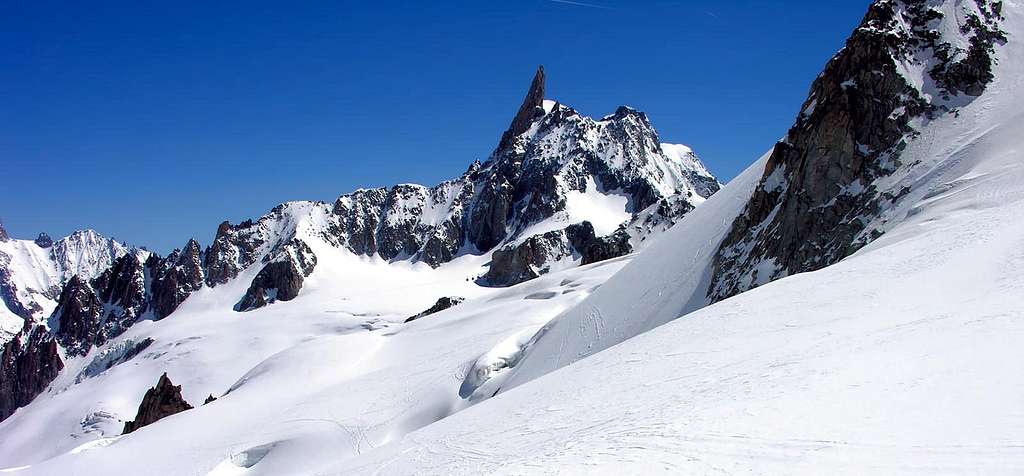
The summit consists of two clearly identified tops, about thirty meters away from each other: Punta Sella 4009 m to the South-West and Punta Graham 4014 m, the highest, to the North-East. On Punta Graham it has been erected a statue of Mary. The most attended route to reach the top of this magnificent spire is the Normal route on the SW side, the route of the first climbers, a classic of the Mont Blanc Massif. This climb is aided with some fixed ropes that have been positioned in some places along this steep and impressive wall. The difficulties are V+ UIAA in free climbing, without using the fixed ropes, while using the fixed ropes the degree befalls to III and IV UIAA. It's a beautiful classic route up a superb spire. The setting is great, with breathtaking views all around over Mont Blanc massif.
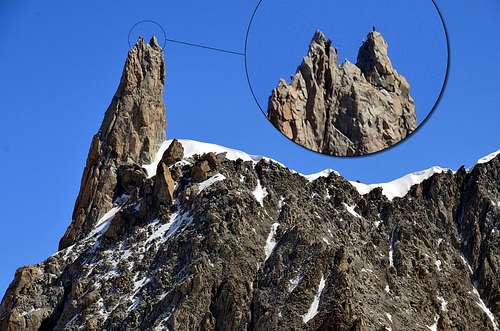
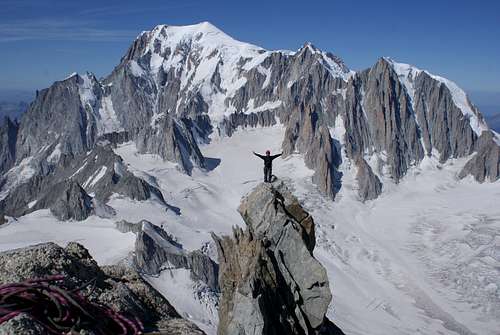
Getting the starting point of the Normal route and South face requires a crossing on the glacier, involving an early morning start to find more solide snow on the "Gengiva". The climb up the snow-covered slopes of the "Gengiva" isn't difficult, but it requires caution. An interesting option may be to climb the peak in combination with the Arete du Rochefort. On the way back from the Aiguille de Rochefort the temperature will be nicer to climb the Dent Du Géant.
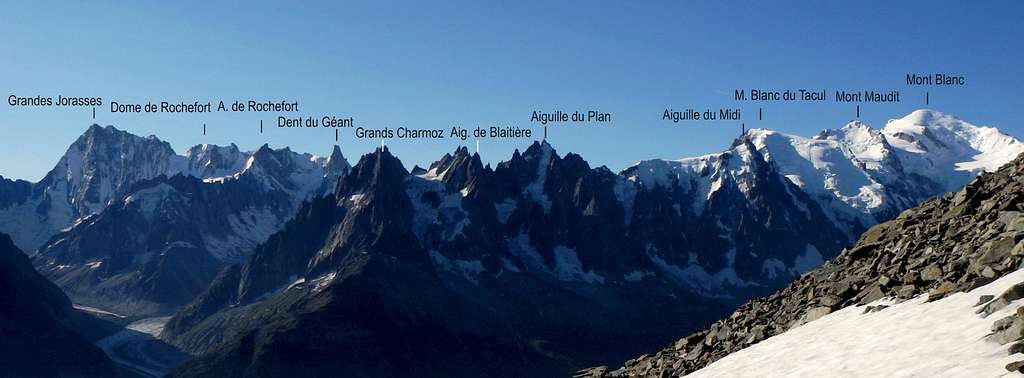
Getting There
Approach from Courmayeur
A good start point is the Torino Hut, which is right next to the second station of the cable car starting from La Palud, Courmayeur, on the italian side of Monte Bianco, close to the entrance of the homonym tunnel. The approach from Chamonix, in the french side of Monte Bianco, is longer.
- From Turin and Milan: follow the A5-E25 Motorway and exit Courmayeur, reaching the hamlet of La Palud m. 1370
- From France: through the Tunnel of Monte Bianco
- From Switzerland: through the Great St.Bernard Tunnel or the Great St.Bernard Col or via Chamonix and Tunnel of Monte Bianco
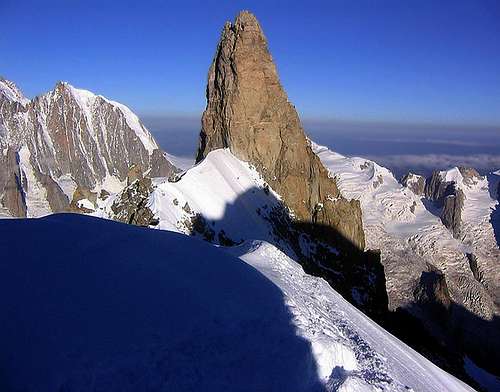
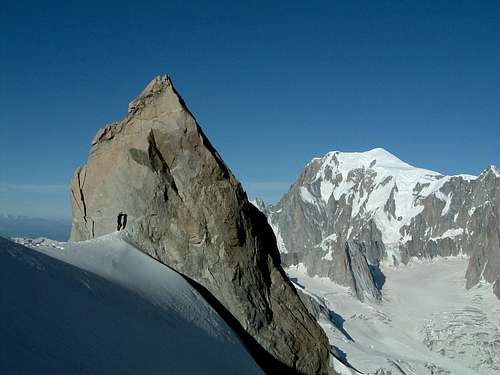
Getting to Rifugio Torino
From Entrèves - La Palud take the cable-car leading directly to Rifugio Torino (exit second station, the first one is the middle Pavillion station, the third one is Punta Helbronner). Info here: Funivie del Monte Bianco
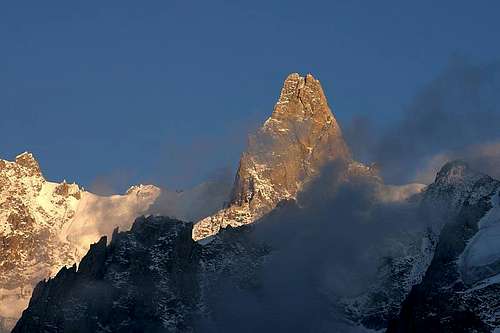
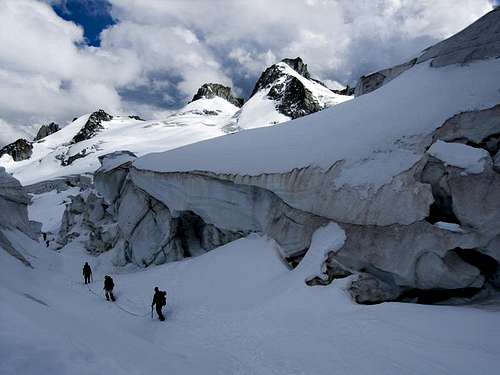
Climbing history
The first attempt to Dent du Gèant, still waiting to be climbed for the first time, was undertaken by Albert Frederick Mummery with Alexander Burgener, who had already won some vertical spires on Mont Blanc group, such as Grepon and Aiguille des Grands Charmoz. They planned to summit this stunning spire on summer 1880. Mummery and Burgener started the ascent, but they gave up the attempt in front of a granite slab, too smooth to be won in free climbing: the current impressive Burgener slab. According to his crystalline ethics, Mummery refused to use any artificial means. On that circumstance he left in place a bottle containing a message which said: “impossible by fair means”. In fact the wall was overcome two years later by the Aosta Valley guides Jean-Joseph, Baptiste and Daniel Maquignaz drilling the rock with mine needles, thus introducing into mountaineering the questionable concept of climbing at any cost and by any means. More information about the climbs realized by Mummery in this article on SP: Albert Frederick Mummery, the man who dared Nanga Parbat




The first ascent of the Northern summit, the highest, was completed the same year, on August 20th 1882, by William Woodman Graham with the French guides Alphonse Payot and Auguste Cupelin. The highest peak was named Punta Graham. Firts ascent of South Face: M. Burgasser, R Leitz 1935, July 28th
Main routes
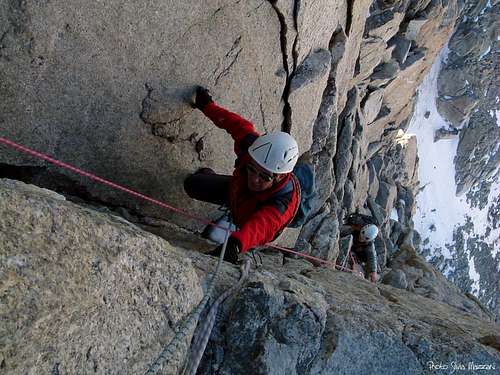
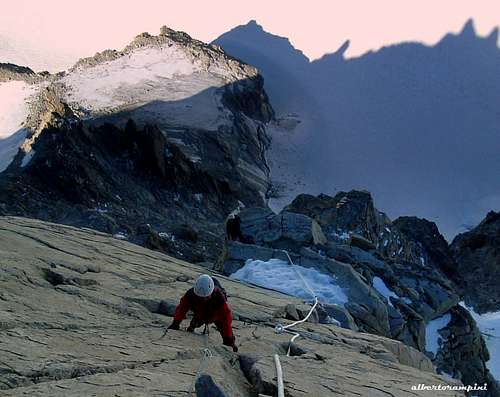
- Normal route - The normal route runs on the SW face. From Rifugio Torino you reach in about 2 hours and a half the Salle à Manger, near the attack of the climb. From the Salle à Manger you turn left to reach the start of the climb on the southwest side. The route counts eight pitches and some sections are equipped with fixed ropes. The third and fourth pitches are situated close to the West edge and climb a 45 meter high slab cut by some cracks, the Placche Burgener. The route has a degree of difficulty AD or D with some moves of V UIAA without use the fixed ropes. See here on SP the full route report: Dent du Géant SW Face (Normal route)
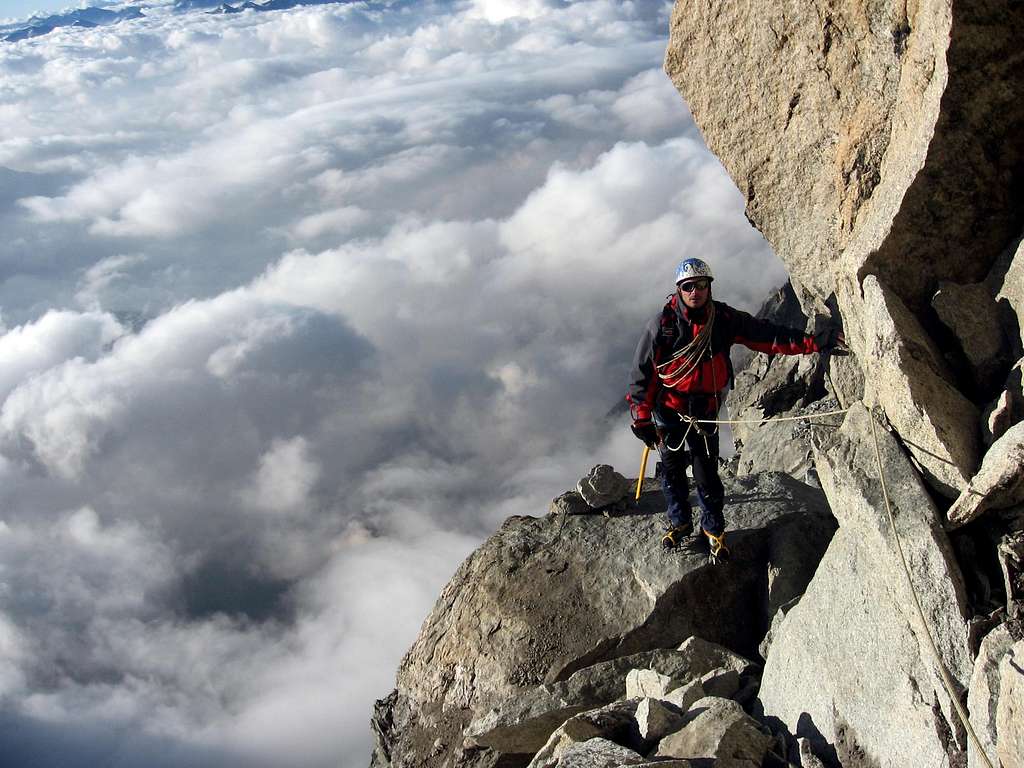
- South wall, Via Burgasser TD, 6c max in free climbung, 160 m - Herbert Burgasser and Rudolf Leisz's in artificial climb July 28, 1935 - First free solo climb performed by Alexander Huber, July 29, 2006
- Géant Branché, 6a (5c obbl.), 140 m
- North wall, Via Ducornau-Mizrahi III / 5 5c, 550 m - July 1975 - First climb of R. Ducornau and R. Mizrahi
- Goulotte Nord IV/5 500 m- First climb of Patrick Gabarrou and Bernard Muller, June 26, 1979
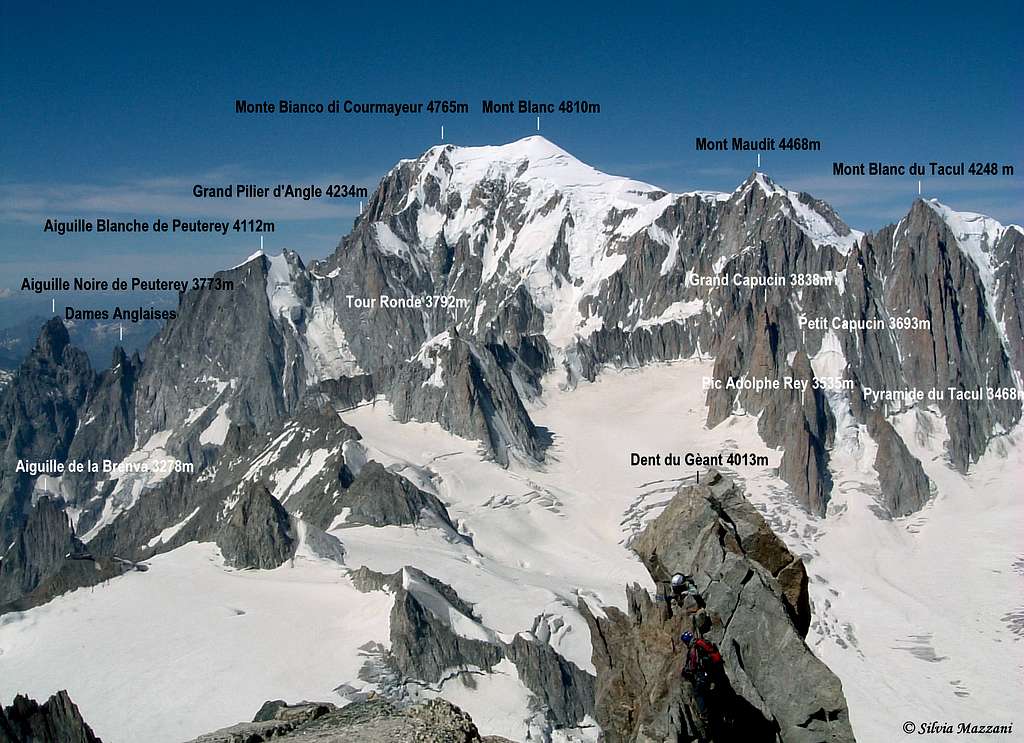
Red Tape
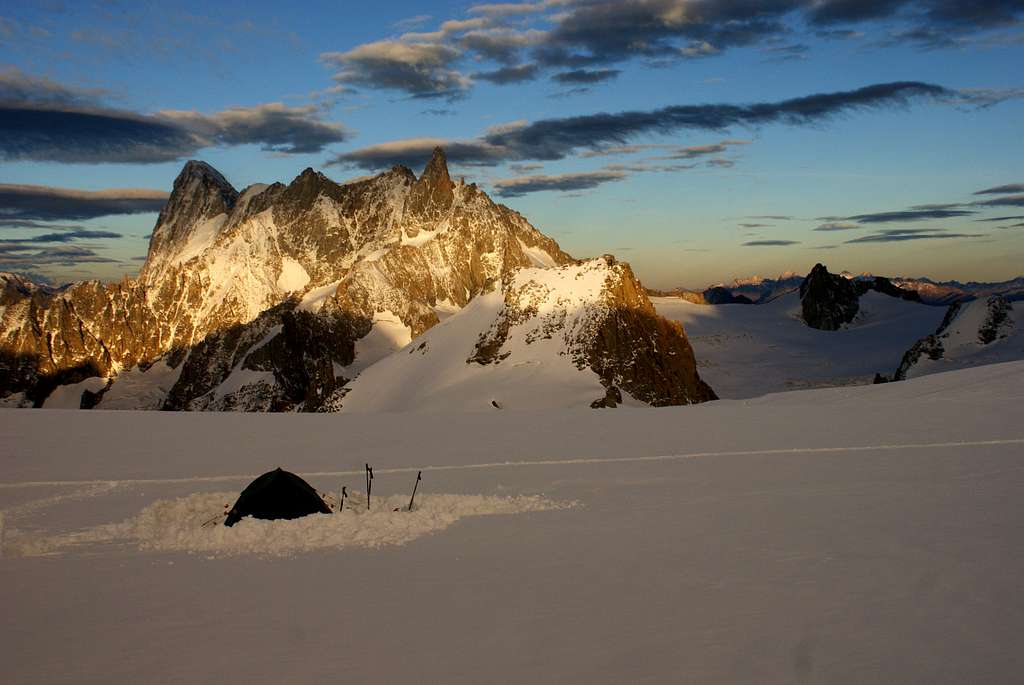
No fees, no permits required
Hut
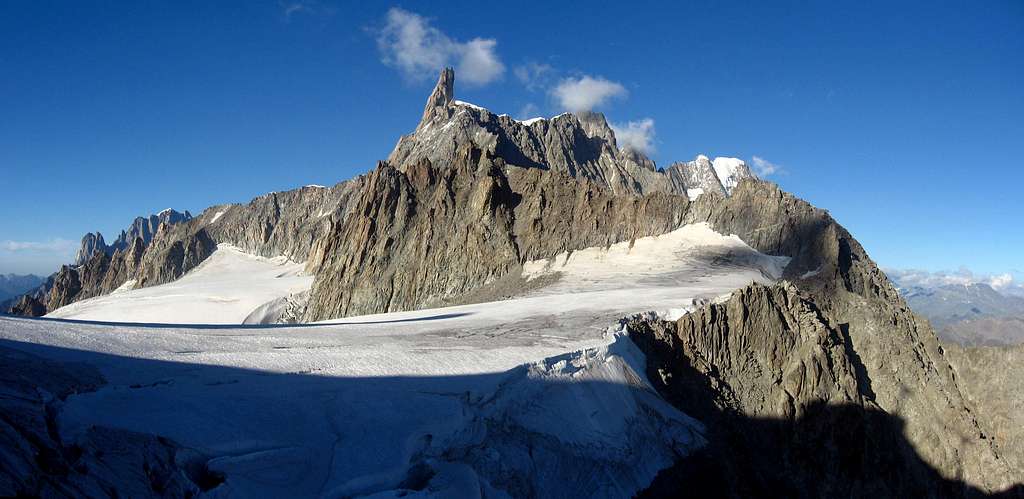
- Rifugio Torino m. 3375 – C.A.I. Sez. di Torino
Other accomodation
Campings and hotels in Courmayeur.
When To Climb
A cold place! The wall, facing SW, catchs the sun late in the morning. Best season goes from July to September
Climbing views
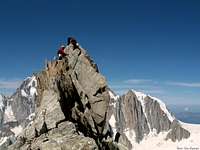
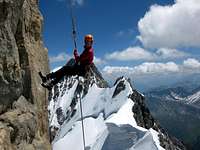


Close-up



Sunrise and sunset
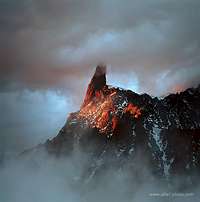


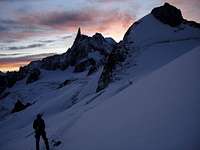
Other images
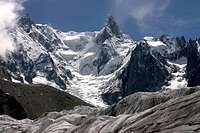



Annotated views


Meteo
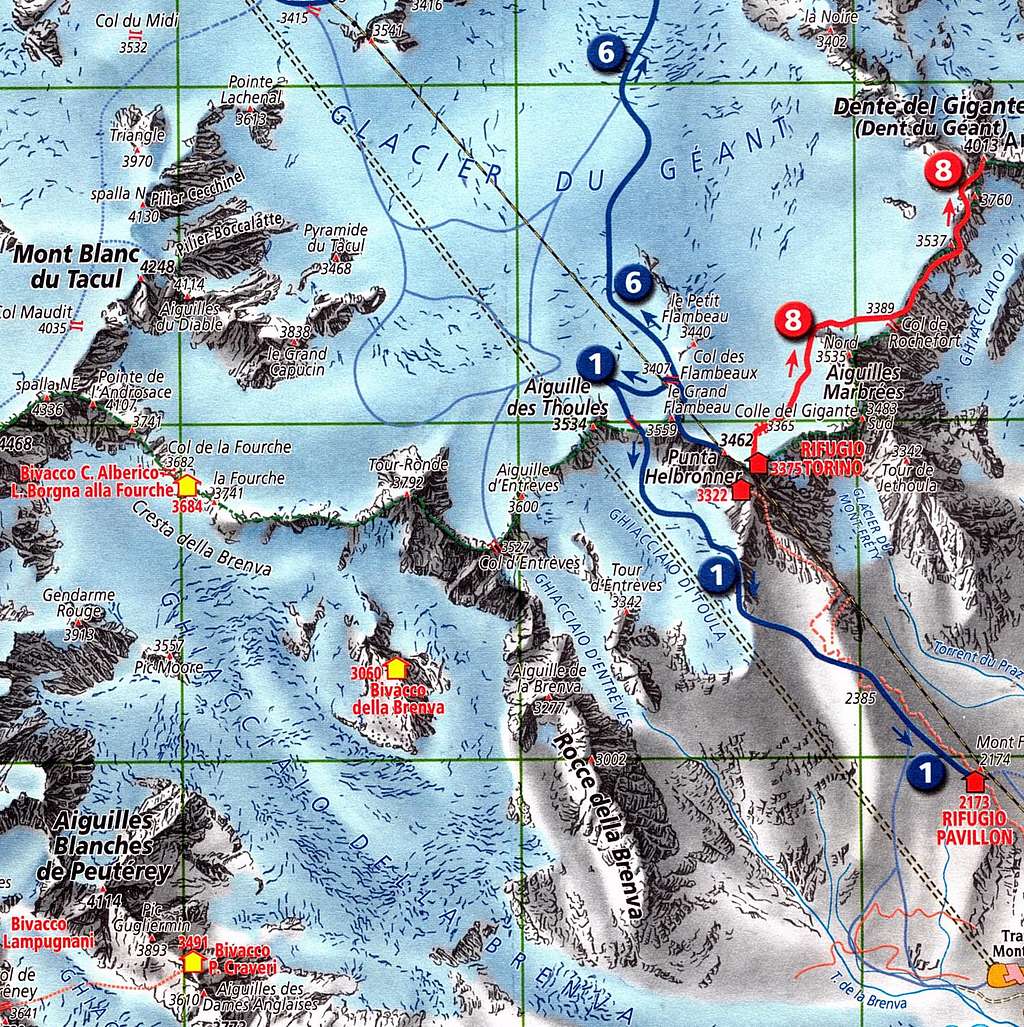
Guidebooks and maps
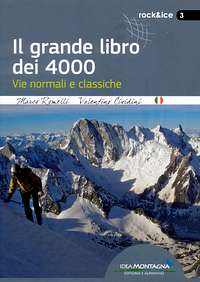
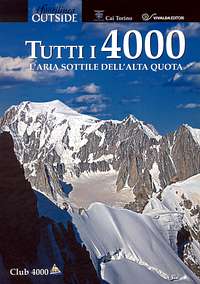

- Guidebooks
- "Il grande libro dei 4000" by Marco Romelli, Valentino Cividini - Idea Montagna Editore, 2015
- “Tutti i 4000” – L’aria sottile dell’alta quota” – CLUB 4000 CAI TORINO – Vivalda Editori
- “The 4000 of the Alps” by Richard Goedeke (CAAI) – All the normal routes to the 4000m. summits of the Alps
- “I Quattromila delle Alpi” by Karl Blodig and Helmut Dumler – Zanichelli Ed.
- "Monte Bianco" vol. 2 - Guida Vallot
- "Monte Bianco" vol.1 - Gino Buscaini, Guida dei Monti di Italia CAI-TCI, 1994
- "The Mont Blanc Massif: the 100 Finest Routes" by Gaston Rebuffat - Baton Wicks Publications, 1996 - ISBN: 1-898573-03-4
- Maps
- Meridiani Montagne “ Monte Bianco” map 1:30.000
- Swiss Topo 292 Courmayeur
- IGN 3531ET St.Gervais Les Bains – Massif du Mont Blanc



